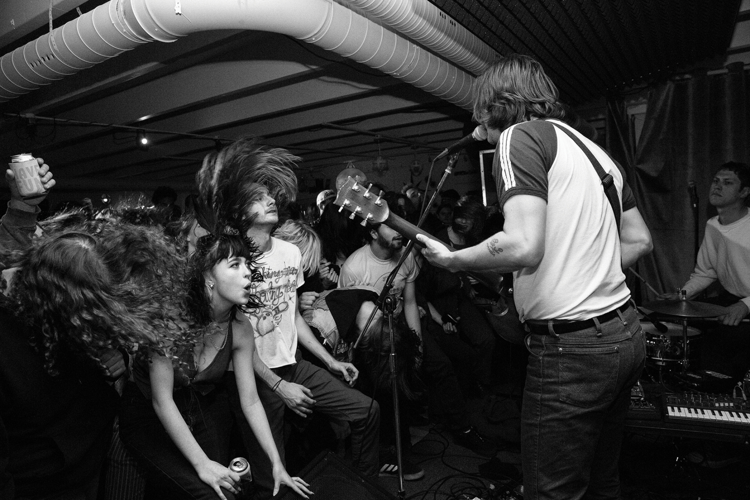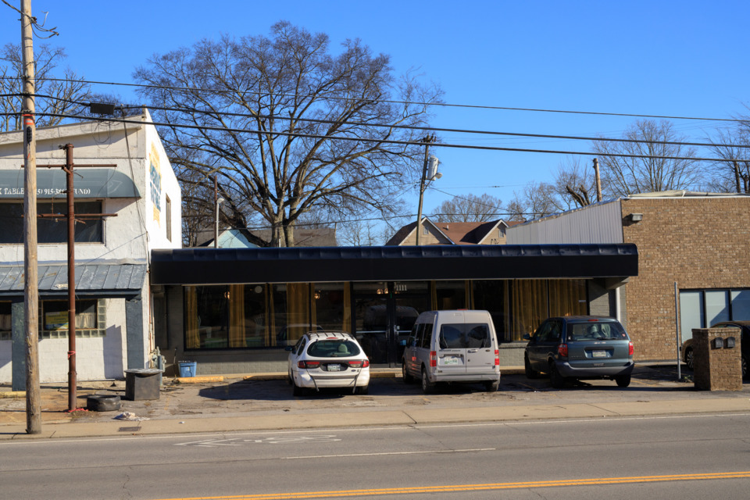
JEFF the Brotherhood at Drkmttr, 4/14/2019
“Everyone that talks about old, old Drkmttr is like, ‘There was a magical quality to it,’ because it was like the last of the Wild West,” says Olivia Scibelli, taking a break from directing load-in ahead of a recent show at the all-ages DIY venue. She’s one of the organizers who has kept Drkmttr afloat during a four-year roller-coaster ride of challenges, including two moves and two closures. “I don’t think Nashville can do that anymore.”
The fifth running of Nameless Fest, happening June 27-29, serves as a stress test and an unofficial housewarming for Drkmttr’s third iteration, which opened its doors in January. The space is a squat storefront at 1111 Dickerson Pike, nicely spruced up from its former days as a bar called Music City Lounge. The festival and the venue, run by the same dedicated crew, also paint a picture of what Nashville can do, even in a time marked by gentrification, skyrocketing real estate prices and civic leaders who don’t always seem to be sure how to address the problems.
Since 2015, Nameless Fest has thrown local punk, hardcore and metal bands into a massive, glorious mosh pit with a horde of touring thrashers. The organizers give specific attention to marginalized voices, showcasing artists across a spectrum of racial and gender identities, many of whom are playing heavy music.
This year’s fest carries on that tradition. Locals like grungy rockers Sad Baxter and hardcore-punk-slash-rapper Kent Osborne feature prominently on the three-day, four-show bill. They’ll share the spotlight with groups like Soul Glo, an African American punk outfit from Philly, whose latest album The Nigga in Me Is Me is a gnarly fist in the face of white supremacy. It’s the kind of lineup that young punks have come to expect from Nameless: loud, diverse, covered in jagged edges.
There is one major change to Nameless Fest this year. It finally has a home.
Until now, Drkmttr has been housed in more tenuous spaces that weren’t able to accommodate the controlled chaos of Nameless. Aside from two shows during Nameless Fest III that took place at the second Drkmttr location on the West Side, the fest has mostly been hosted at off-the-grid houses and punk-friendly venues like The East Room and The End. This year, all three of Nameless Fest’s nightly shows will be at Drkmttr, while a daytime show on Saturday is set for Grimey’s.
Both Drkmttr and Nameless Fest rose from the ashes of The Other Basement, a house venue near Belmont University where Kathryn Edwards lived and formed her booking company, aptly named The Other Booking. After about two-and-a-half years of hosting all-ages shows with headliners like JEFF the Brotherhood and Peach Kelli Pop, The Other Basement shut down in summer 2014. With similarly minded East Side spot The Owl Farm having closed a few months earlier, punks too young to get into venues like Mercy Lounge or Exit/In (or too weird to get booked there) were left without a place — as has happened time and time again.
Edwards moved on to booking at The End and Betty’s Grill, but she dreamed of something more stable. She spearheaded the first Nameless Fest in June 2015, and the next month she launched a crowdfunding campaign titled “Nashville’s Much Needed All Ages DIY Space” that netted just shy of $3,000 to support the first incarnation of Drkmttr.
“I had kinda been pushing the idea around,” Edwards says, “and there were literally no spaces doing anything [for DIY music].”
That August, Drkmttr opened in a funky old house a couple blocks from the Nashville City Cemetery. The rent was cheap, and the building had a cool, gritty feel to it. All the same, when the opportunity arose in 2016, Edwards & Co. moved to a more structurally sound space, a former barbershop in West Nashville.
At that point, Drkmttr became a larger collective, spreading the labor of maintaining an unconventional venue among a group of 19 co-conspirators, including Scibelli, who fronts the rock band Idle Bloom and has a long history with YEAH!, the nonprofit behind Southern Girls Rock Camp. She co-signed the lease on the barbershop with Edwards and dug into the day-to-day of running a venue. The second Drkmttr, which became ground zero for rising punk and rock bands, was a haven that felt a little more legit than your buddy’s basement but still had an air of looseness. A few months later, it screeched to a halt.
It’s tough to talk about DIY spaces in 2019 without also talking about Ghost Ship, the Oakland, Calif., warehouse-turned-underground-art-collective that erupted in flames on Dec. 2, 2016, killing 36. In the days and weeks after that tragic event, there was a nationwide crackdown in which attention from fire marshals and codes authorities directly or indirectly shuttered what seemed like any venue billed as a DIY space. In Nashville, that included The Glass Menage, Meal Ticket and Drkmttr. When hard-touring lagomorph punks Nobunny played Drkmttr on Dec. 5, officials from the fire marshal’s office arrived and shut the show down.
The venue was given two options: Shape up the space and get an occupancy permit, or shut down permanently. It’s the kind of thing that can put even well-established venues in significant financial peril (see the Metro sprinkler ordinance that threatened Exit/In a decade ago, or threats of $50-per-violation fines for flyers on utility poles that have been hitting venues all over town this spring), so it’s easy to see how tough it can be for a collective that’s barely breaking even on $5 metal shows.
Scibelli became a constant fixture in the Metro Codes office, while Edwards and other volunteers did backflips to work through a checklist of accessibility and safety improvements: crash bars on exit doors, ADA-compliant bathrooms and more. Permits secured, Drkmttr reopened in April 2017. In addition to being the first (and so far only) DIY space to reopen following the mass closure, it became the first dedicated all-ages venue without a religious affiliation to operate above board in Nashville since The Muse closed in 2012.
Still, the Drkmttr crew didn’t own the building. In February 2018, facing a dwindling pool of volunteers and the ever-looming specter of the barbershop space being sold, Edwards, Scibelli & Co. opted to vacate the spot and shut down for the time being. (The building, at 4003 Indiana Ave., did sell not long after Drkmttr left. It now houses The Barbershop Theatre.) That’s the thing about DIY spaces: Their greatest enemy isn’t the fire marshal, or the narcs, or that one skinhead who keeps showing up and ruining everyone’s good time. It’s the struggle to run a sustainable business in the margins.

Outside the new Drkmttr, January 2019
All the same, the Drkmttr crew’s work didn’t go unnoticed. A little history: In the 1990s, Donnie and April Kendall joined Lucy’s Record Shop proprietor Mary Mancini in helping that Church Street store fulfill a similar role to the one Drkmttr has today: a place where young folks could build a community through participating in music. The Kendalls, Mancini, her husband Kurt Wagner (of Lambchop), and David Abbey pooled resources to purchase the building at 1111 Dickerson Pike with the specific goal of helping Drkmttr become sustainable.
“We’re hopeful that Drkmttr can be a great space for all ages to experience music and sense of community for many years to come,” Donnie Kendall says in an email. “We’ve seen firsthand what a difference it can make to kids that are attempting to find their place in this challenging world we live in. It’s also something Nashville is desperately lacking.”
Now that they’re situated in a space that won’t get pulled out from under them, Edwards, Scibelli and Gnarwhal guitarist Chappy Hull (a longtime volunteer who signed on as their third business partner after the reopening) can attend to bigger goals. The venue’s kitchen offers a limited menu of vegan food, which could be developed into a draw for customers. They aim to achieve federal nonprofit status. They also want to expand their audience by bringing in more events and shows that don’t originate in their inner circle. Meanwhile, they have Nameless Fest V to run. All of these tie in with Drkmttr’s core values.
“Things that we have kept are the things that I think are the most important,” says Edwards, “which is: always being all-ages; making sure that we have a safe space; and making sure that the artists that we have are representative of the diversity of what people want to see, specifically in underground music.”



